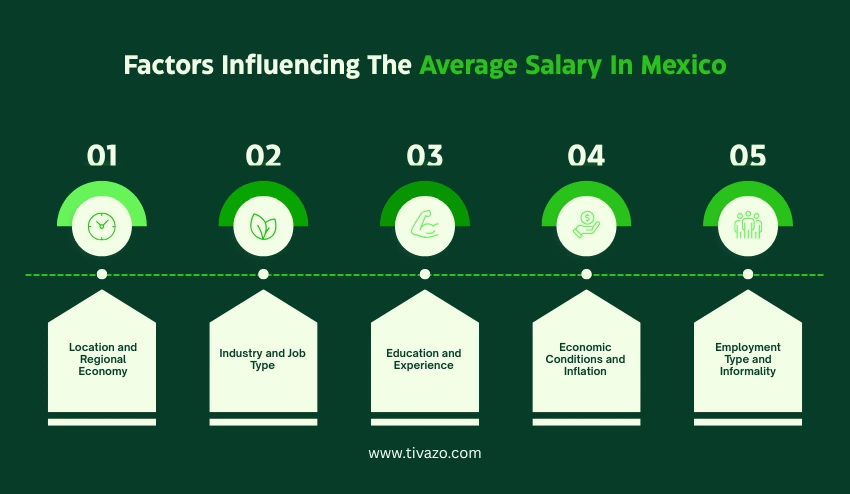Wondering what is the average salary in Mexico? If you intend to work, relocate, or hire talent in Mexico, it is essential to understand the country’s economy in terms of average salaries.
The average salary in Mexico differs significantly according to the industry, region, and level of experience. In Mexico City, which is a busy city, wages may vary greatly depending on factors such as education, type of job, and cost of living, among other factors, in the smaller towns.
This guide will analyze the most recent information on the average salary in Mexico in 2025 according to occupations and geography. We are going to delve into how incomes are formed today, based on the minimum wage variations, economic circumstances, and new tendencies such as remote working. At the end, you should have a good idea of what is to be expected, whether you are a job hunter or an employer in Mexico.
💡Key Highlights:
- Factors Influencing The Average Salary In Mexico
- Annual Salary Increment In Mexico
- Cost of Living in Mexico and How It Impacts Salaries
- Average Income by Profession in Mexico
- Tivazo’s Role in Ensuring Salary Accuracy and Fair Pay
Factors Influencing The Average Salary In Mexico
It is not enough to examine the figures when it comes to the average salary in Mexico, since a number of factors define the earnings of workers in the country. These factors define the difference in salaries and give a good background to those who would like to know about the Mexican labor market.

1. Location and Regional Economy
The salaries vary greatly according to the region. Mexico City, Monterrey, and Guadalajara are metropolitan cities that provide higher wages because of the developed industries and the increased cost of living. Conversely, most rural regions and small towns in Mexico have lower average pay. The Northern Border Zone, close to the US, is also enjoying high wages due to the cross-border economic activity.
2. Industry and Job Type
The industry you are in has a drastic effect on your income. Technology, finance, and engineering jobs are usually highly paid above the national average. On the other hand, hospitality, retail, and agriculture are usually on low pay scales. This wage disparity is of great concern to the average salary in Mexico, and this disparity is based on the industry.
3. Education and Experience
There is a direct relationship between a higher education level and professional certification, and salaries. Employees with a bachelor’s degree or specialized training tend to receive higher pay as compared with employees who have a high school diploma. Likewise, experience counts: the more experienced the professional, the higher the pay, as he or she advances in the career. These factors significantly impact the average salary in Mexico, creating wide variations across industries and education levels.
4. Economic Conditions and Inflation
The general economic well-being of Mexico and inflation also affect the trend of salaries. An increase in inflation may destroy purchasing power, which will trigger salary adjustments. The government has policies that would encourage an increase in minimum wages, which work to reverse this issue, yet economic changes are a major determinant of the average salary in Mexico.
5. Employment Type and Informality
Formally employed workers are likely to be paid more and have better benefits compared to those who work informally, who are likely to be paid low and are not guaranteed their jobs. The rate of informal employment is also rather high in Mexico, which affects the real image of the average salary in Mexico.
Understanding these factors, anyone considering the average salary in Mexico will be able to get a deeper insight into the complexities of the numbers and be able to make a proper judgment about working and earning in this vibrant nation.
Annual Salary Increment In Mexico
In Mexico, the rate of salary increment per annum is 4 and 7 percent per annum, depending on industry and performance. Sectors with high demands, such as IT and finance, can have increments of up to 12 percent. RemotePeople states that entry-level employees usually receive an increase of 11.8%, and the mid-level and senior workers receive approximately 6.1 and 5.3, respectively.
Companies are also being forced to change their pay more often due to inflation, which averages 4.6 percent in 2024. The cities, such as Mexico City, and the states at the border tend to give better and more frequent increases. On the whole, annual increases are one of the factors that have contributed to the slow rise in the average salary in Mexico.
Cost of Living in Mexico and How It Impacts Salaries
The cost of living in Mexico is relatively cheap in comparison to most countries, particularly the US and Europe. This low cost is regularly expressed in the average salary in Mexico. Numbeo shows that the cost of living in Mexico City is approximately 57 percent less than in New York City.
This misalignment implies that even though the average wages may appear low in terms of absolute values, the purchasing power may be quite decent, depending on the area and the style of life. To give an example, the cost of living would be cheaper in rural and small cities, but the salaries will be lower, and in large cities like Mexico City or Monterrey, salaries will be higher, but so will the costs.
Minimum Wage in Mexico: The Baseline
Since January 1, 2025, the general daily minimum wage in Mexico rose by 12 percent, or MXN 248.93 a day, to MXN 278.80 per day, which is approximately USD 13.75. In the Northern Border Free Zone (where one can find such cities as Tijuana and Juarez), the price increased by 10.27 percent, or MXN 374.89 to MXN 419.88, or about USD 20.70 per day. This sets the national minimum wage to about MXN 8,364 (~USD 493) and about MXN 12,596 (~USD 742) in the border zone per month.
These minimum wages are the reference base on which the average salary in Mexico is measured. These required minimum wages have formed the expectations of entry-level workers and affect wage patterns in different industries, despite the fact that many workers continue to earn below the countrywide average. The 2025 increase is an attempt to maintain the buying power, counter inflation, and minimize income disparities in the nation.
Average Income by Profession in Mexico
Salaries in Mexico vary significantly based on the job sector and skill level. Here are some approximate monthly salaries in MXN:
| Profession | Average Monthly Salary (MXN) | Average Monthly Salary (USD) |
| Software Developer | $35,000 MXN | ~$2,000 USD |
| Accountant | $22,000 MXN | ~$1,260 USD |
| Marketing Specialist | $25,000 MXN | ~$1,430 USD |
| Customer Support Agent | $12,000 MXN | ~$690 USD |
| Construction Worker | $9,500 MXN | ~$540 USD |
| Teacher (Public School) | $13,000 MXN | ~$740 USD |
| Lawyer | $30,000 MXN | ~$1,720 USD |
| Nurse | $15,000 MXN | ~$860 USD |
| HR Manager | $28,000 MXN | ~$1,600 USD |
| Call Center Representative | $10,000 MXN | ~$570 USD |
| Data Analyst | $27,000 MXN | ~$1,550 USD |
| Administrative Assistant | $11,000 MXN | ~$630 USD |
Exchange rate used: 1 USD ≈ 17.5 MXN (as of mid-2025)
Salary Comparison: Mexico vs USA and Other Countries
Comparing it with world pay scales, the average salary in Mexico is far lower than in developed states such as the United States, Germany, or Canada. The average gross annual salary in Mexico is about $16,200 USD in 2025, in the United States it is about 59,428 USD, and in Germany it is about 53,800 USD. This broad disparity is an indication of inequality in the levels of economic growth, demand for labor, cost of living, and levels of productivity. Mexico makes less than Chile and Costa Rica, even in Latin America, but it outperforms others such as Colombia and Peru in certain areas.
Even though the differences exist, the average salary in Mexico is slowly rising because of foreign investments, labor regulations, and nearshoring patterns. High-tech, finance, and manufacturing are contributing to improved wages in the cities. Nevertheless, there is still a wage gap in wages that is determined by geography, education, and professional position. In the case of outsourcing remote employees or the relocation of personnel, it is important to know how Mexico ranks among other countries in terms of compensation requirements.
In short:
| Country | Average Annual Salary (USD) | Average Monthly Salary (USD) |
| United States | $59,428 | ~$4,950 |
| Germany | $53,800 | ~$4,480 |
| Canada | $52,600 | ~$4,380 |
| Australia | $54,400 | ~$4,530 |
| United Kingdom | $47,000 | ~$3,920 |
| Mexico | $16,200 | ~$1,350 |
| Chile | $19,500 | ~$1,625 |
| Costa Rica | $17,400 | ~$1,450 |
| Colombia | $9,600 | ~$800 |
| India | $5,700 | ~$475 |
Regional Salary Differences in Mexico
Mexican average income also differs greatly according to the region, with some areas being highly industrialized, with low cost of living and high economic activity, and other areas quite the opposite. The larger cities like Mexico City, Monterrey, and Guadalajara provide above-average salaries all the time. As an example, the average monthly salary in Mexico City may go up to approximately MXN 22,000 (USD 1,300), whereas in less urbanized states such as Oaxaca or Chiapas, it may be only MXN 14,000 (USD 830). These metropolises are magnets for foreign investments and home to the headquarters of big corporations, which makes them have a higher level of pay in various industries, such as technology, finance, and business services.
Conversely, southern and rural states are still behind because they have fewer job opportunities and less industrialization. In states along the border, like Baja California or Nuevo Leon, wages are frequently supplemented by the presence of the U.S. trade and manufacturing (maquiladora) zones, driving monthly incomes well beyond the national average. This geographical difference in wages is fundamental in the analysis of the average salary in Mexico, particularly for those employers who are thinking of having a remote workforce or companies that are expanding to other states. Such regional dynamics can be used to ensure competitive and fair compensation strategies.
The Impact of Education and Experience on Salary
Among the most critical factors that determine the average salary in Mexico, education and experience are among them. National labor statistics indicate that employees who have just a high school certificate receive an average of MXN 9,500 (USD 565) monthly, whereas the maximum amount of money that employees with a university degree can get is between MXN 18,000 and 22,000 (USD 1,070 and 1300) per month. Graduates holding master’s degrees or doctorate degrees usually earn a salary that is higher than MXN 30,000 (~USD 1,780) per month, particularly in the areas of medicine, engineering, and law.
Experience is also a very important factor. The entry-level employees are normally paid 30-40 percent less than the mid-career employees. As an example, less than two-year experience software developers can earn MXN 15,000, and those with more than five years can make more than MXN 30,000 per month. Depending on the industry, senior-level specialists with leadership positions can receive more than MXN 50,000 (~USD 3,000) per month. These trends indicate that the earning capacity of people increases dramatically with the attainment of qualification and actual working experience- that is, the average salary in Mexico increases.
Skilled Labor and Remote Work Salaries in Mexico
Remote work has become a growing trend, especially for tech and digital jobs. According to Time Doctor, remote professionals in tech-related roles can command salaries above the national average, often aligning more with international rates.

Skilled labor in manufacturing or specialized trades also earns better wages compared to unskilled sectors, but the disparity remains significant.
Expat Salaries in Mexico: What to Expect
Salaries of expatriates who work in Mexico may differ significantly in relation to the industry and the employer. Managerial or technical expats usually receive higher than the average salary in Mexico, often with additional benefits such as housing, transportation, and education allowances.
Based on Horizons data, the expats in Mexico City could expect to earn more than USD 25,000 a year, which is significantly higher than the local average but still affordable in contrast to the wages in the US or Europe.
Economic Factors Affecting Salaries in Mexico
The economy of Mexico is hit by the issues of inflation, currency fluctuations, and income inequality, which have an impact on the average salary in Mexico. The World Bank reported that even as Mexico has experienced continuous economic growth, wage growth was not steady and at the required rate to keep up with inflation.
There is also the problem of the gender pay gap, where women are paid about 16 percent less than men on average, as the Mexican government reports reveal.
How to Negotiate Your Salary in Mexico
If you’re job hunting or seeking a raise in Mexico, understanding local salary standards is crucial. Here are some tips:
- Research industry-specific salary benchmarks.
- Highlight relevant skills and experience, especially certifications or degrees.
- Factor in the cost of living differences if relocating between cities.
- Consider benefits as part of total compensation (bonuses, health insurance, etc.).
Tivazo’s Role in Ensuring Salary Accuracy and Fair Pay
Payroll management in Mexico may be complex, more so due to the differences between the average salary in Mexico by industry and the differences between the average salary in Mexico by region. Tivazo makes this process even more efficient by integrating high-quality calculations of the salaries and effective employee monitoring tools, which makes payroll accurate and transparent to the owners of the business, CEOs, and remote team leaders.

Automatic time tracking, periodic screenshots, and activity monitoring features of Tivazo will make sure that you will only pay the real hours of work, and you will not have payroll errors and time theft. Such openness implies that the workers are being remunerated fairly according to actual productivity, which is absolutely in line with the market rates of the average salary in Mexico.
Tivazo provides a solution to companies to ensure that they comply with local labor laws and wage regulations by automating smart payroll. Whether you’re managing in-office staff or remote workers across Mexico, Tivazo guarantees accurate, timely salary payments, helping you build trust, improve efficiency, and attract top talent.
Conclusion
The average salary in Mexico varies widely by location, industry, education, and experience. While nominal wages may seem modest compared to developed countries, adjusted for cost of living, many Mexicans manage a decent quality of life.
Are you considering moving to Mexico or negotiating a salary here? What salary expectations do you think are realistic based on this data?
FAQ’s
What is the average rent in Mexico?
The average rent in Mexico ranges from $250 to $600 USD per month, depending on the city and type of housing. Urban centers like Mexico City or Guadalajara tend to be on the higher end, while smaller towns offer more affordable options.
What is the highest paying job in Mexico?
Some of the highest paying jobs in Mexico include medical specialists, IT managers, finance directors, and legal professionals. On average, these roles can earn $40,000–$60,000+ USD annually, well above the national average salary in Mexico.




